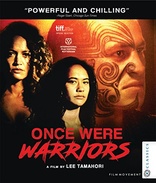Once Were Warriors Blu-ray Movie
HomeOnce Were Warriors Blu-ray Movie 
Film Movement | 1994 | 103 min | Rated R | Sep 06, 2016Movie rating
7.9 | / 10 |
Blu-ray rating
| Users | 4.5 | |
| Reviewer | 4.0 | |
| Overall | 4.0 |
Overview
Once Were Warriors (1994)
Jake Heke lives with his family in a tenement house for native Maori in the slums of Auckland. Despite his professions of love, Jake's anger and alcoholism results in terrifying erratic outbursts at his children and violent beatings of his wife, Beth. After Jake loses his job, each member of the Heke family is forced to face their own demons and the societal constraints that shackle native New Zealanders.
Starring: Rena Owen, Temuera Morrison, Mamaengaroa Kerr-Bell, Julian Arahanga, Taungaroa EmileDirector: Lee Tamahori
| Drama | 100% |
Specifications
Video
Video codec: MPEG-4 AVC
Video resolution: 1080p
Aspect ratio: 1.78:1
Original aspect ratio: 1.85:1
Audio
English: DTS-HD Master Audio 5.1 (48kHz, 24-bit)
English: Dolby Digital 5.1 (448 kbps)
Subtitles
English SDH
Discs
Blu-ray Disc
Single disc (1 BD)
Playback
Region free
Review
Rating summary
| Movie | 5.0 | |
| Video | 4.0 | |
| Audio | 4.5 | |
| Extras | 2.0 | |
| Overall | 4.0 |
Once Were Warriors Blu-ray Movie Review
Heritage
Reviewed by Michael Reuben September 9, 2016"Our people once were warriors", Beth Heke tells her abusive husband, Jake, at the conclusion of
director Lee Tamahori's 1994 adaptation of the bestselling novel by New Zealand author Alan
Duff. Beth proceeds to elaborate on the yawning gulf between Jake's appalling behavior and the
Maori heritage of which Beth remains proud, but her words merely add the exclamation point to
Once Were Warriors' vivid illustration of a noble culture's decline amidst poverty and
marginalization. Duff's semi-autobiographical novel exploded onto the scene in 1990, riveting
New Zealand readers with its graphic depiction of crime, alcoholism and domestic violence in
the Maori tenements of Auckland. The New Zealand Film Commission initially balked at
supporting a film adaptation, fearing that no one would pay to see Duff's bleak family saga on
the screen, but it eventually relented, in part because the screenplay penned by playwright Riwia
Brown rejiggered the plot to offer a glimpse of redemption. Defying the predictions of the Film
Commission, the finished product proceeded to out-gross Jurassic Park in New Zealand.
Adjusted for inflation, Once Were Warriors remains the nation's highest grossing indigenous
film to date.
Film Movement is adding Once Were Warriors to its rapidly expanding Blu-ray library. The film
has lost none of its raw power in the intervening years. As Roger Ebert said of the two lead
performances: "You don't often see acting like this in the movies. They bring the Academy
Awards into perspective."
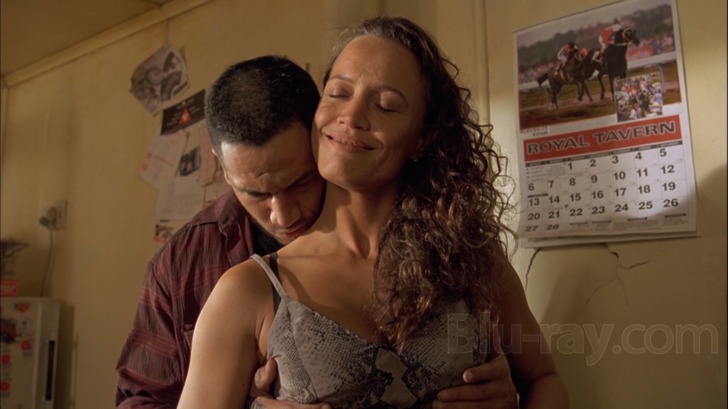
Beth and Jake Heke (Rena Owen and Temuera Morrison, both in bravura performances) married eighteen years ago over the objections of Beth's family to a match with a man whose nickname is "The Muss" for his muscular build and fighting prowess. Jake moved Beth from her country town to the slums of Auckland, where she has borne him five children. Even after all this time, a passionate fire burns between them, but it can quickly blaze into fury and conflict, especially when the couple has been drinking. Alcohol consumption skyrockets in the Hekes' crumbling tenement after Jake loses his job and applies for public assistance, which pays almost as much as unskilled labor. With nothing but free time on his hands, Jake spends his days in bars picking fights and betting on horses, after which he invites everyone home for a nightly party. The younger children hunker down in their shared bedroom, trying to sleep through the racket and cowering in terror when, as so often happens, violence erupts between their parents.
Thirteen-year-old Grace Heke (Mamaengaroa Kerr-Bell) serves as a substitute mother for her younger sister and brother, Polly and Huata (Rachael Morris Jr. and Joseph Kairau). A sensitive soul with a vivid imagination, Grace writes fairy tales in the notebook she carries with her everywhere, and she reads her stories both to her two younger siblings and to her best friend, Toot (Shannon Williams), who lives in a wrecked car under an overpass covered in graffiti. When Jake beats his wife so badly that she cannot go out in public, it is Grace who takes her mother's place at a sentencing hearing for older brother Boogie (Taungaroa Emile), who has been convicted of petty crimes. On the recommendation of the social services agency, Boogie is removed from the household and placed in foster care, which turns out to be an improvement, as the foster home's Maori director, Bennett (George Henare), educates his native charges in their distinctive heritage. (Anyone familiar with Whale Rider will recognize the ceremonial exercises in which Bennett drills his charges.) A more contemporary—and more sinister—version of Maori culture is embraced by the eldest Heke child, Nig (Julian Arahanga), who joins a violent gang that, after a punishing initiation, proclaims itself to be his new family.
Tamahori captures these events with a kinetic visual style and a realism so unflinching that one is hard-pressed to cite a comparably visceral portrayal of the brutality and terror of domestic abuse and sexual assault. Perhaps most shocking of all are Beth's continued professions of love for Jake, even after he has pummeled her nearly unconscious. It takes a tragedy involving the children—one caused by the disgraceful actions of Jake's younger brother, Bully (Cliff Curtis)—to fortify Beth with the resolve to change her circumstances.
Once Were Warriors contrasts the urban squalor and aimless indulgence of Jake and his buddies with the dignity and nobility of the Maori heritage represented by Bennett and also by Beth's extended family, who rally to her support in her darkest hour. Despite years of abuse and self-inflicted harm, Beth retains a connection to a traditional society in which she can regain her footing, while Jake rejects all ties to his people and their past, relying solely on his fists and his anger to get by (if Jake's life can be considered "getting by"). The film is both a searing portrait of a family in crisis and a snapshot of a once-proud culture desperately seeking to maintain its identity against an onslaught of economic and social change. Beth salvages what she can from the wreckage of her home life, but the tenements and bars remain standing as the aimless partying continues.
Once Were Warriors Blu-ray Movie, Video Quality 
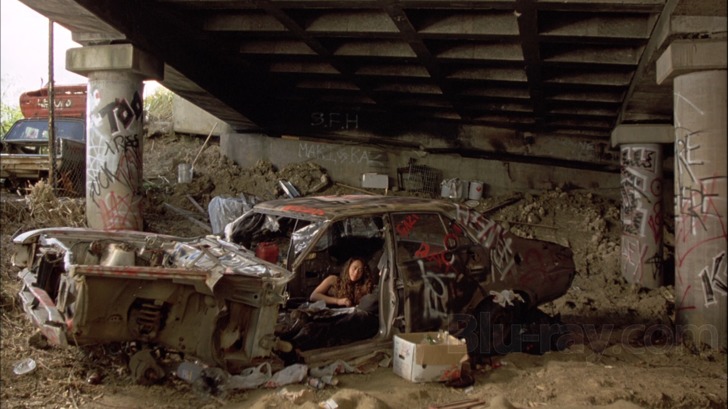
Once Were Warriors was shot on film by British-born cinematographer Stuart Dryburgh (Bridget
Jones's Diary and, most recently, Alice
Through the Looking Glass). Film Movement did not
provide any information about the transfer, but this appears to be a recent scan from a well-preserved element that is only occasionally marred by
speckling and minor damage (including a
few moments where the picture flickers briefly). The 1080p, AVC-encoded Blu-ray features a
film-like image with a finely resolved grain structure and fine detail sufficient to render both the
urban debris and the elaborate tribal tattoos. A palette dominated by warm yellows, reds and
browns reflects the characters' heightened emotional states and provides a contrast with cooler
environments like the courtroom where Boogie's case is adjudicated and natural locales like the
countryside where the Hekes take a family excursion that ends badly. Blacks are solid, and
contrast appears accurate. Film Movement has mastered Once Were Warriors with an average
bitrate of 34 Mbps, with a solid encode.
Note that the opening and closing credit sequences have been slightly letterboxed and
windowboxed (see screenshot no. 7), presumably to protect the graphics from being cropped by
overscan.
Once Were Warriors Blu-ray Movie, Audio Quality 
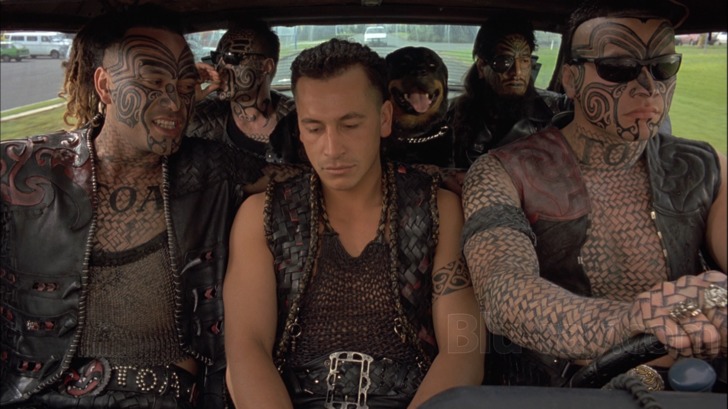
Once Were Warriors was released to theaters in Dolby Surround, which was remixed for Dolby Digital 5.1 when the film was issued on DVD. The 5.1 track on Film Movement's Blu-ray is presumably the same 5.1 mix, but encoded in lossless DTS-HD MA. The track features broad dynamic range and deep bass extension that is used to give the city's traffic a constant and overbearing presence. Even the traffic passing over the underpass where Toot lives in a derelict car rumbles menacingly. The surrounds are used for environmental ambiance, which opens out the action convincingly. Stereo separations are strong, with specific sound effects routed to the left and right of the front soundstage. The dialogue is clearly rendered, but ears unaccustomed to New Zealand pronunciations may need to consult the optional subtitles. The score is credited to Murray Grindlay (Sleeping Dogs) and Murray McNabb, but the film's most memorable musical moments are supplied by rap, reggae and rock bands, especially the grinding guitar motif of the theme composed by Tama Renata of the New Zealand band Herbs.
Once Were Warriors Blu-ray Movie, Special Features and Extras 
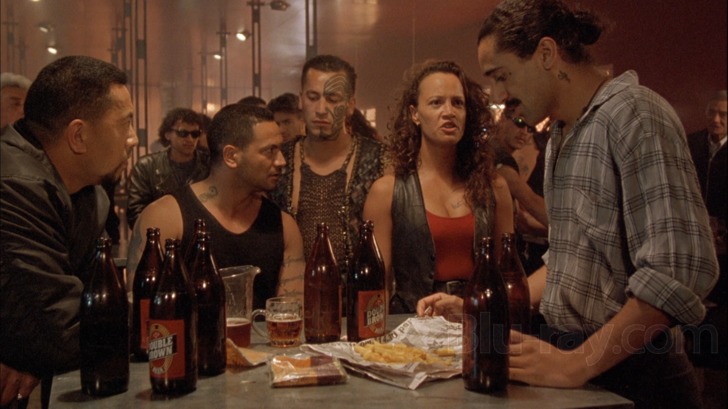
Once Were Warriors was initially part of the Criterion Collection, which released a laserdisc
version in 1995 that included a commentary by director Lee Tamahori. The same commentary
was carried over to the DVD released by New Line Cinema in 2003, which added a behind-the-scenes featurette and a tattoo gallery. The commentary
is not included here, presumably because
of rights issues, and I have been advised by a fan of the film that the featurette on Film Movement's
Blu-ray is the same as on New Line's DVD. Both the DVD and the laserdisc are now
out of print, although the commentary is available on an Australian
Blu-ray release.
- Behind the Scenes (1080p; 1.85:1; 11:42): This vintage featurette is preceded by a disclaimer regarding imperfections in the source material, which cause occasional interruptions in the image and sound. Interviews with director Tamahori, screenwriter Brown, producer Robin Scholes and actors Temuera Morrison ("Jake"), Rena Owen ("Beth"), Taungaroa Emile ("Boogie"), Julian Arahanga ("Nig") and Mamaengaroa Kerr-Bell ("Grace") alternate with films clips and on-set footage.
- Trailers (1080p, except where otherwise noted): Trailers marked with an asterisk also play at startup.
- Once Were Warriors Original Theatrical Trailer (480i; 1.85:1; 2:08)
- *Kamikaze '89 (1.66:1; 1:34)
- *Violent Cop (1.85:1; 1:22)
- *The Quiet Earth (1.85:1; 1:00)
- Antonia's Line (1.78:1; 1:48)
- The Pillow Book (1.33:1; 1:34)
- Francesco (1.78:1; 1:50)
- *Film Movement (varous; 0:49)
- Booklet: The enclosed booklet contains a disc chapter listing, film credits, stills and an insightful essay by film critic Peter Calder of the New Zealand Herald.
Once Were Warriors Blu-ray Movie, Overall Score and Recommendation 
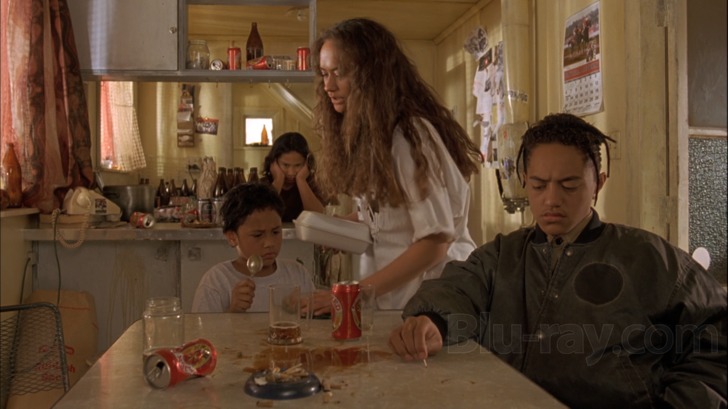
Once Were Warriors may not be everyone's idea of entertainment, but its cinematic
craftsmanship is flawless and its emotional impact is rarely equaled on the screen. The film's
characters and their actions (for good or ill) stay with you long after the credits roll. While it's
unfortunate that Film Movement could not obtain the director's commentary, its Blu-ray
presentation of this remarkable film is compelling and highly recommended.
Other editions
Once Were Warriors: Other Editions
Similar titles
Similar titles you might also like

A Star Is Born
2018

The Country Girl
1954

Tender Mercies
1983

God's Pocket
2014

Dallas
1978-1991

Mass
2021

Hearts in Atlantis
2001

Hounddog
2007

Special Dead
2006

Prey for Rock & Roll
2003

Her Smell
2018

Educating Rita
1983

Respect
2021

Rudderless
2014

Bee Gees: One Night Only
1997

Bird
1988

The Buddy Holly Story
Limited Edition to 3000 - SOLD OUT
1978

Pearl Jam Twenty
2011

Jimi: All Is by My Side
2013

Hill Street Blues: Complete Series - Seasons 1 - 7
1981-1987
